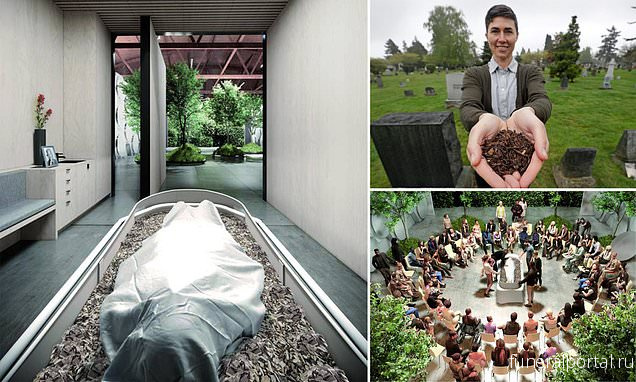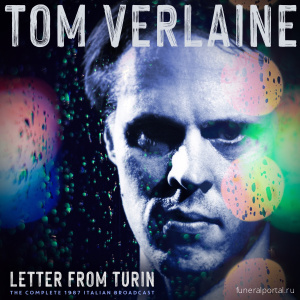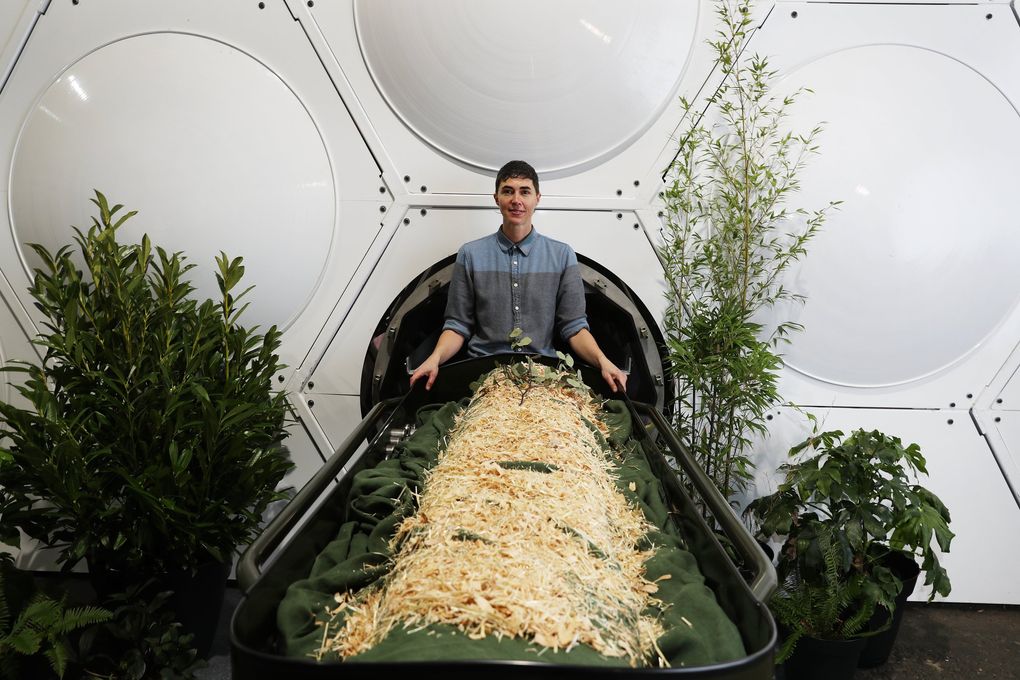
Katrina Spade, who removed her mask a moment for a portrait, is founder and CEO of Recompose, the natural organic reduction (or human composting) funeral home in Kent. Spade stands in front of part of a large array of... (Ken Lambert / The Seattle Times)
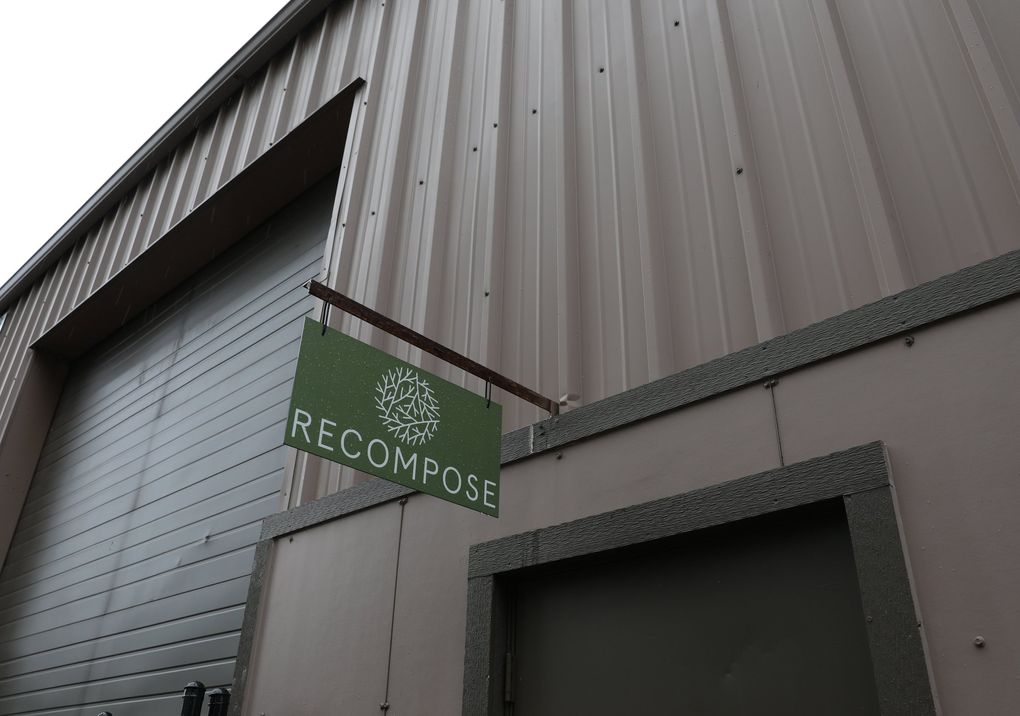
A small sign is seen outside Recompose, the natural organic reduction (or human composting) funeral home on Jan. 5 in Kent. (Ken Lambert / The Seattle Times)
By Brendan Kiley. Seattle Times features reporter
Somewhere in Kent, tucked anonymously into acres of warehouses and light-industrial workshops, the first full-service human-composting funeral home in the United States is operational.
After nearly a decade of planning, research and fundraising — not to mention a successful campaign to change state law — Recompose is finally converting people into soil.
Outside, the entrance to Recompose looks like most of its neighbors — just another unit in a tall, almost block-sized building with plain metal siding and big, roll-up warehouse doors. But inside, it feels like an environmentalist’s version of a sleek, futuristic spaceship: spare, calm, utilitarian, with silvery ductwork above, a few soil-working tools (shovels, rakes, pitchforks) on racks, bags of tightly packaged straw neatly stacked on shelves, fern-green walls, potted plants of various sizes.
One immense object dominates the space, looking like an enormous fragment of white honeycomb. These are Recompose’s 10 “vessels,” each a hexagon enclosing a steel cylinder full of soil. One day in mid-January, eight decedents were already inside eight vessels, undergoing the process of natural organic reduction (NOR) or, more colloquially, human composting.

At Recompose, “vessels” full of soil undergo the process of natural organic reduction (NOR) or, more colloquially, human composting. (Ken Lambert / The Seattle Times)
One vessel contained the remains of Ernest “Ernie” Brooks II, a renowned underwater photographer. Organic-farming pioneer Robert “Amigo Bob” Cantisano lay in a second. A third held Paulie Bontrager, a committed environmentalist, vegan and nature lover from West Virginia who died unexpectedly while visiting her daughter in Burien.
Charlotte Bontrager, Paulie’s daughter, had read about Recompose a couple of years ago in a newspaper article.
“I discussed it with my mom,” she said. “We talked about how cool it was and why it took so long to get a service like this. I remember her saying: ‘If it’s at all possible when I die, I want to go that way.’ Longevity runs in my family — her uncle died a year ago at 104 — and I said: ‘Oh mom, you’ll be around another 30 years. I’m sure it’ll be in place by then.”
Two years later, her mother was in a Seattle hospital with a mortal, previously undetected lung condition. Bontrager refused to search for disposition options until her mother had passed. Once she had, at 5:45 a.m., a month before what would’ve been her 75th birthday, Bontrager googled “Seattle” and “human composting” — and found that Recompose was ready.
“My mom was a very humble, loving person and would not want any kind of spotlight,” Bontrager said. “But she’d be thrilled to know she was among this first group of pioneers.”
The first bodies were “laid in” on Dec. 20, 2020, a landmark moment on a nearly 10-year journey for Recompose founder and CEO Katrina Spade. She first began mulling funerary alternatives during a minor mortality crisis of her own, as an architecture student at the University of Massachusetts, Amherst, with a partner and two young children.

Spade researched her options, which were limited to traditional burial (too toxic and expensive), cremation (too carbon-intensive) and rural green burial (too rare and inconvenient for most city dwellers). She started thinking about composting as a kind of soil-based cremation and, in 2013, finished her Master’s thesis: “Of Dirt and Decomposition: Proposing a Place for the Urban Dead.”
Other mileposts followed: feasibility studies in 2015 (with the Department of Forensic Anthropology at Western Carolina University) and 2018 (with soil scientist Lynne Carpenter-Boggs at Washington State University), a push to change state law allowing NOR to be a legal means of disposition for human remains (signed by Gov. Jay Inslee in May 2019) and raising $6.75 million in capital to get Recompose going.
In 2020, two other NOR competitors emerged: Herland Forest, a natural-burial cemetery in Klickitat County with one vessel (which it calls a “cradle”) and Return Home, which plans to open its Auburn facility with dozens of vessels in April.
Recompose costs $5,500 for everything: the body pickup (in King, Pierce and Snohomish counties), the paperwork, the process itself and an optional service. (Body transport from further away can be arranged, for an extra fee, and Recompose has already accepted bodies from California and the East Coast.)
Death care prices in the U.S. tend to be extremely inconsistent and often opaque, with few funeral homes listing costs online — a situation consumer-rights advocates have been shouting about for years. Recompose pricing is transparent and not especially expensive, but it’s not especially cheap. According to a 2020 price survey by local nonprofit the People’s Memorial Association, cremation prices in Washington state vary by 745% (in King County, the range is $525-$4,165) and burial prices by more than 400% (again, in King Country, from $1,390 for the most frugal, direct, no-service burial to $11,100 for a complete, high-end funeral service).
The Recompose process takes 30 days in a vessel full of wood chips and straw, then another few weeks in “curing bins,” large boxes (one per person) where soil is allowed to rest and continue exhaling carbon dioxide. Once that process is complete, friends and chosen family can either retrieve the soil themselves, or donate it to an ecological restoration project at Bells Mountain near Vancouver, Washington. So far, most have elected to donate.
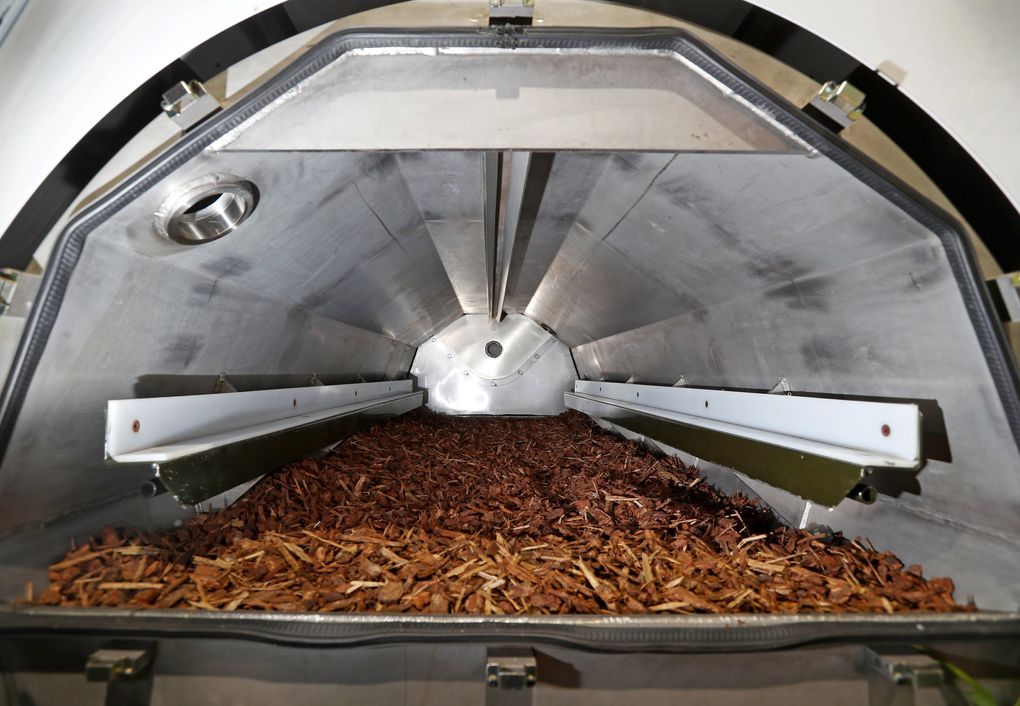
Inside one of Recompose’s “vessels,” which are designed to hold a body, occasionally rotating, during a 30-day process, before going to a curing bin for another 30 days. (Ken Lambert / The Seattle Times)
Each vessel, Spade explained, is carefully monitored for temperature and moisture content — sensors take temperature readings every 10 minutes — to make sure the microbes inside are getting what they need for safe, efficient composting. Each vessel is slowly rotated a few times during the process. (All compost needs turning.) State regulations say the soil must maintain a temperature of 131 degrees Fahrenheit for 72 hours to safely cook away pathogens like fecal coliform and salmonella. The state also requires Recompose — and a third party — to test for those pathogens in the resulting soil, as well as heavy metals, including arsenic, lead and mercury. (The state also prohibits people who have contracted certain diseases — tuberculosis, prion infections like Creutzfeldt-Jakob disease — from undergoing NOR.)
“This is a very controlled process, completely driven by microbes,” Spade said. “It’s fueled by plant material and monitored in a very rigorous way.”
Oxygen is another necessary ingredient. Air is blown into each vessel through one set of tubes while exhaust is released through another set, passing through carbon-activated filters.
Steve Van Slyke, compliance director for the Puget Sound Clean Air Agency said the emissions and odors from NOR are expected to be minimal compared to other operations they review, including cremations, demolitions of asbestos-filled buildings and marijuana cultivation. Recompose’s air permit requires no visible emissions from the facility, adequate filters, no detectable odors and independent review by a third party every three months.

Lynne Carpenter-Boggs, who removed her mask for a moment for a portrait, is lead soil research adviser at Recompose, the natural organic reduction funeral home in Kent. Carpenter-Boggs is a... (Ken Lambert / The Seattle Times) More
Carpenter-Boggs, the soil scientist from WSU, is on hand during the first months of Recompose to keep a careful watch on the soil — and to help Spade and her team care for the dead. (Carpenter-Boggs has served as an unpaid adviser to Recompose for several years but, in her current capacity, she’s working as a paid adviser.) Before each body is laid into its vessel, Spade said, Carpenter-Boggs is usually the one who reminds everybody to take a moment and a few deep breaths. She often recites a poem by the 13th-century Sufi poet Rumi.
“It’s been quite an incredible experience for me,” Carpenter-Boggs said. “I don’t come from the funeral-care world at all and I’ve learned a lot over the past five or six years.”
Friends and chosen family of the deceased can watch that laying-in process over a livestream — or, once coronavirus restrictions are lifted, in person. So far, about 30% of the bereaved have chosen that option, including the Bontrager family, who assembled a soundtrack of their mother’s favorite music. The final song, Charlotte Bontrager said, was “Under the Boardwalk” by the Drifters.
“As I’ve learned more about Recompose, I’ve found it to be a very graceful and beautiful way to go,” Bontrager said. “It’s the natural way, the way every living thing in history has eventually been cared for, from an apple core to a human — you’re not being burned up, not being pumped full of embalming chemicals and taking up space in a container. It seems like a peaceful way for the body to move on to the next phase.”
MORE ON HUMAN COMPOSTING- Washington becomes first state to legalize human composting
- Life after death: Recompose, a soil-based alternative to burial and cremation, moves closer to reality
- Competition emerges in the Seattle-area human-composting funeral business
Brendan Kiley is a Seattle Times features reporter.
